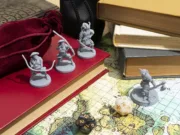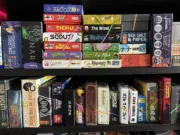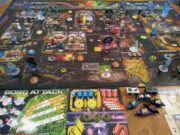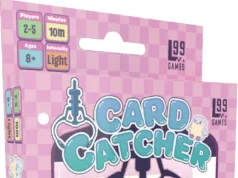 “For I have sworn thee fair and thought thee bright,
“For I have sworn thee fair and thought thee bright,
Who art as black as hell, as dark as night.”
Little is known of the identity of the “Dark Lady” referred to in several of William Shakespeare’s published sonnets. Indeed, this fact has eluded scholars and historians for more than four centuries. Enter Black Sonata, a solitaire game of hidden movement and deduction, which places a player onto the streets of London circa 1600 with a mission to discover clues and uncover the identity of this mystery woman.
Designed by John Kean and published by Side Room Games, a player attempts to connect the dots as they pursue the Dark Lady’s movement from one iconic location to another. Gameplay takes approximately thirty minutes and is suggested for ages fourteen and older.
Gameplay Overview:
Apparently, Shakespeare’s sonnets—if taken literally—offer many hints as to the identity of the Dark Lady. Black Sonata provides twelve possibilities, each Lady with her own set of three characteristics. For example, Lucy Morgan’s card depicts three characteristic symbols: a heart (amorous), a crown (court connections), and a chain (documented link to Shakespeare). There are seven possible characteristics in play each game.
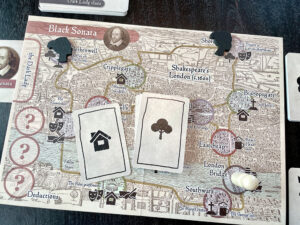
For setup, one Lady clue card is randomly chosen and placed face down near the map board. Another card with the matching suit (there are six suits) is placed with location cards nearby. The other ten clue cards go into a draw deck and may be successfully gained during play. Then a stealth deck will be built from a set of other cards.
With the stealth deck now in hand, the player chooses a location on the map board. Play starts by advancing the stealth deck (moving the top card to the bottom of the deck). This represents the Lady moving from one location to another. Each stealth card features an icon that matches locations on the board. For example, the top card of the deck may feature a boat, which corresponds to three of the eleven locations available. If the next card is a church icon, the player tracks all possible locations where she’s able to move from boat to church.
Once the Lady has moved, choose one of the following options:
- Move to an adjoining location
- Search for the Lady at your current location
- Use a fog card action
- Pass
Each location a player moves into gives them a location card, required before searching for the Lady in said location. Once all location cards are acquired, the matching suit clue card becomes available to the player. More clue cards are gained by successfully searching for, and finding, the Lady on the current player location.
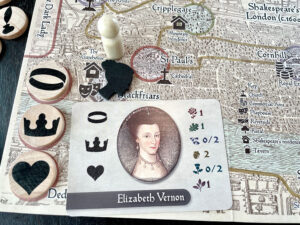
Gaining clues is how you win. Each card features three characteristics on the left, and on the right is a key telling you how many of these characteristics apply to the hidden Dark Lady card. It takes several clue cards to begin to deduce the three true characteristics needed to confront the Dark Lady.
Also note that when a player searches, a fog card is drawn and placed on top of the stealth deck. The stealth card used for searching is discarded from the game. As such, when a player returns to that position in the deck later, they’re unable to search, creating uncertainty regarding the Lady’s movement. Additionally, each search action advances the stealth deck several cards equal to the gained clues. The closer you get to her identity, the faster she moves.
Once confident in which three characteristics are correct, the player conducts a final search for the Lady and reveals the hidden card. If all three characteristics match, the player wins and can then tally their score. A player loses if the fog deck is depleted, the stealth deck is cycled a certain number of times, or the final search is unsuccessful.
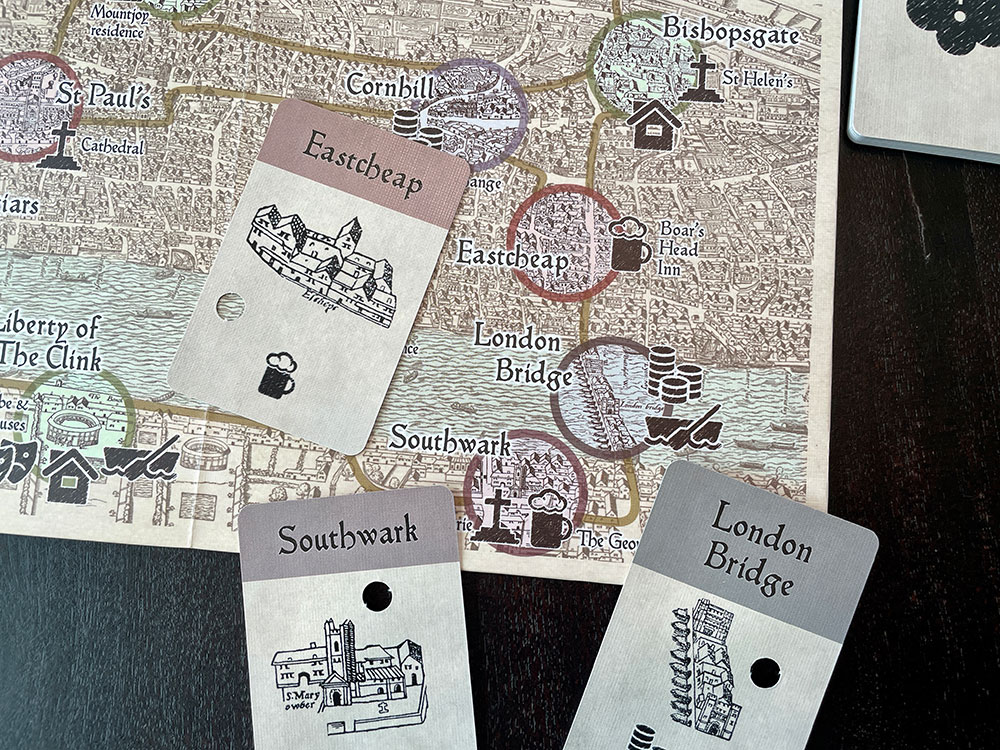
Game Experience:
For a solitaire game, Black Sonata packs a lot into its relatively small box. It’s very easy to set up, plays in a half hour, pushes back a little, and can even allow for another player to sit in and help with the deduction process. Add to that the thematic flair surrounding the search for Shakespeare’s Dark Lady, the snippets of poetry on the backs of cards, and the ever-ticking clock, you’ll realize there’s a lot to enjoy. It even comes with a separate booklet that gives historical weight to the ladies as well as the locations, with a few of Shakespeare’s sonnets for good measure.
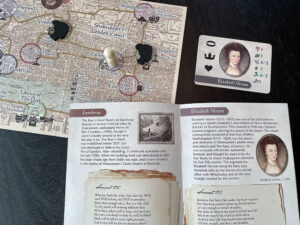
The hidden movement system built into Black Sonata is deeply layered. As each game ramps up, chasing down locations whilst also dealing with fog cards keeps things tense. This is especially true as you cycle through the deck, seeing a repeated pattern, and then having to try to remember which location the Lady moved to during the previous cycle. Beyond the eight possible sequences (sixteen if you reverse them, Z to A), the rulebook provides twenty more options (can also be reversed), as well as five different difficulties made possible by changing the composition of the clue deck.
That said, it doesn’t take long to get the hang of how the system works. Tracing the path of the Lady is assisted by the optional tracking tokens, so regardless of whether she moves or not, keeping location options in mind is always possible. This is where the fog card system comes to save the day.
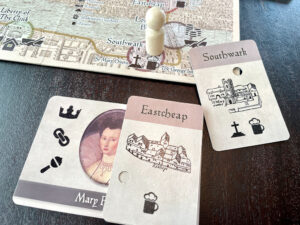
The fog cards create an alternate end game condition and limit the number of times one can search on a whim. Every time a fog card is revealed in the stealth deck, it brings a new and exciting wrinkle to the search. Add to this the option to use a fog card action, which may or may not come in handy, also gives players a lot of potential choice. Some of these cards may provide movement bonuses, while others may shorten the fog deck or advance the stealth deck further.
The deduction puzzle is also an area that becomes easier over time. It typically takes four to six clues to solve the three characteristics of the hidden Lady card. As such, players will find a constant need to adjust the difficulty to keep the tension fierce. I was able to play games at the easy, normal, and advanced modes and win nearly 80% of the time. The expert mode may provide a more suitable challenge for those who’ve mastered the other options.
Final Thoughts:
Black Sonata started as a print and play game before garnering attention and getting picked up for production. Thankfully this saw the light of day as a physical release, especially during a time when, just like Shakespeare in the 1600s, we’re battling a plague and keeping our distance from others. I highly recommend this for solo gamers and for duos who are looking for a thematic puzzle. While it may not be as shelf stable as some titles, there’s plenty to explore before offering it up to family or friends.
For those who are seeking more challenging gameplay, an expansion for Black Sonata titled The Fair Youth is available and provides several modules to increase gameplay complexity. And for those who delight in historical mysteries, plenty of care has been given to providing immersion into this Elizabethan puzzle.
Final Score: 3.5 stars – A cunning deduction game steeped in historical context and filled with enough cat and mouse mechanisms to provide ample material for your next sonnet.
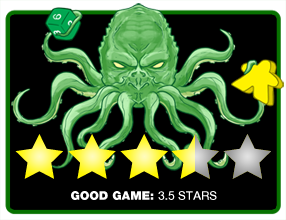 Hits:
Hits:
• Clever hidden movement system
• Captivatingly thematic
• Fog cards heighten the tension
Misses:
• Gameplay lacks variety
• Deduction grows less intriguing over time




